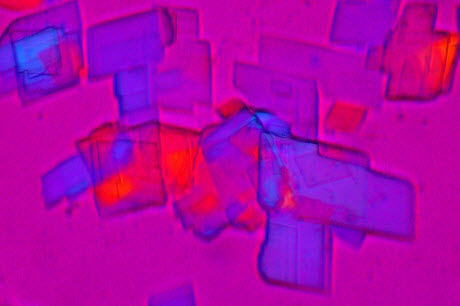If cholesterol had a love child with DNA, it'd look like this

This modern art-like image of cholesterol crystals in synovial (joint) fluid was provided by Flickr user euthman.
There was some interesting breaking news last week about cholesterol. A promising study by the University of North Texas Health Science Center indicates that there's some potential for adding small interfering RNA to synthetic high-density lipoproteins (that's "good cholesterol" or HDL) in order to fight cancer tumors.
And you thought the tech world had buzzwords!
Basically, scientists have figured out how to shrink or kill ovarian cancer tumors in mice using a tag team created from a synthetic form of "good cholesterol" and siRNA (kind of like double-stranded DNA, but a special single-stranded sort).
We're definitely going to be keeping an eye out for more information on this topic, although it'll probably be quite awhile before any evidence from yet-to-be-prepared human clinical trials is published.
I think it's really cool that there's some super-hero, dynamic-duo, cancer-fighting action in the news from "good cholesterol," especially since information has come to light in the past few years indicating that there's a disappointing spectrum of quality even in the "good cholesterol".
In plain English, this pretty much means that there's some goody-two-shoes "good cholesterol", and some not-so-good, slacker-not-living-up-to-its-potential "good cholesterol".
Cholesterol made simple
Even without all the nuanced information, cholesterol is one of those subjects people seem to find confusing. There are a lot of acronyms, and it's challenging to keep track of their meanings and implications.
Although a total serum (blood) cholesterol count is a useful number to have, it's even more useful to pay attention to the breakdown of types of lipoproteins (fat/protein combos) in your blood. Lots of folks know that there's a "good" kind and a "bad" kind, but how do you remember which is which? Here's a very simplistic explanation.
It may be helpful to remember that the "good cholesterol" is the HDL cholesterol, or high-density lipoprotein. Because it's good and it Helps a person be Healthy, you want the number to be High.
Think of HDL molecules as the garbage trucks that go around and clean up your blood vessels. They take out the trash (the "bad cholesterol") via the lymph system to the liver. Think of your liver as a trash/recycling dump. You want a good number of garbage trucks to keep your city streets (arteries) clean.
Healthy HDL numbers should be 60 mg/dL (milligrams per deciliter) and above, because those numbers indicate protection against heart disease. Levels lower than 40 mg/dL for men, and less than 50 mg/dL for women, are considered to be a major risk factor for heart disease.
The "bad cholesterol" is the LDL, or low-density lipoprotein. It's the trash cluttering up the blood vessels. When there's too much trash for the trucks, arteries clog up with plaque, making it harder for your circulatory system to work effectively, and increasing the risk of blood clot-related health problems.
LDL is Lousy for your health and should be kept Low (the same goes for VLDL or very low-density lipoprotein). In general, at LDL levels of 130mg/dL or less, there's a reduced chance of stroke or heart attack. Numbers lower than 100 mg/dL are considered to be even better.
If you want a better understanding of this sticky subject, spend some time poking around the American Heart Association's Cholesterol page. Heck, while you're at it, visit their main Conditions page and learn about many interesting aspects of heart health.
How do I "keep an eye" on my cholesterol?
If you're over 20 years of age, it's a good idea to keep an eye on your cholesterol by having it tested at least once every five years (or more often if your doctor advises).
You'll have to fast for half a day or so before having blood drawn, but you'll know more about your blood's total cholesterol, your LDL, your HDL, and your triglyceride (the body's most common fat type) levels. If need be, your doctor may recommend lifestyle changes or cholesterol-lowering medications such as "statin" drugs (so-called because many of their names end in the suffix -statin).
The American Heart Association is a great resource for more information about what your cholesterol levels mean.
The same things you hear recommended over and over again for all aspects of maintaining or gaining good health in modern society apply to cholesterol, as well.
Avoid tobacco smoke, maintain a healthy weight, and get your body moving for at least a half hour a day on most days. Talk to your doctor about the dietary modifications that are right for you, and which take into account your total health picture.
Home cholesterol tech
One fascinating technology available today is the home cholesterol monitor. A search on Amazon.com for "cholesterol meter" yielded 43 results. These monitors are a lot like the home blood glucose monitors with which many people are familiar, and which are used by diabetics in the management of their blood sugar levels.
Home cholesterol monitors can help reveal shifts in your cholesterol numbers, and show trends with regards to the effects of medications, exercise, different foods, and so on.
The Amazon reviews for these gadgets are all over the map. Unfortunately, since I don't personally own a cholesterol tester, I can't recommend a specific model -- although your doctor may be able to do so. You should definitely talk to your doctor about it anyhow, because these monitors aren't meant to be a substitute for actual medical attention. These devices are simply a means of gathering and sharing pertinent data with your treatment team.
If I were going to use one, I would probably purchase it at the time I had my official fasting blood test done, and compare results. That would be an interesting benchmark, and maybe clue me in on what kind of accuracy I could expect from the device. What can I say? I'm a geek. Geeks like gadgets and benchmarks.
There's an app for that
A search in Apple's iTunes on the App Store yielded an interesting app which is meant for tracking cholesterol levels. It's available for your iPhone, iPod touch, or iPad.
Called Cholesterol Log by G.P. Imports, Inc., this program seems like a nice little tracking tool for cholesterol trends. It has a number of graphing options to help you with your analysis, screenshot capability, and a social networking aspect.
There's only one customer review from a guy who seems to like it okay, but it's all of a buck, and probably worth trying.
Let us know how you deal with your cholesterol questions, quandaries, and tracking in the TalkBacks below. Also, if you use or decide to try this app or any of the cholesterol monitors, let us know what you think!
